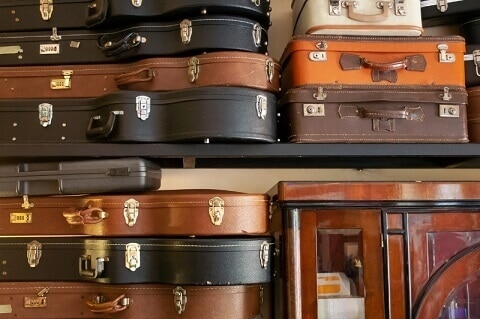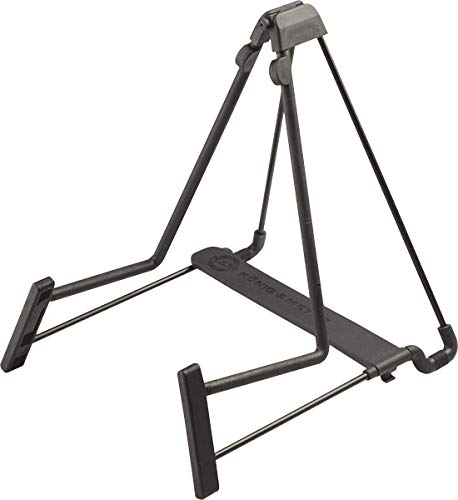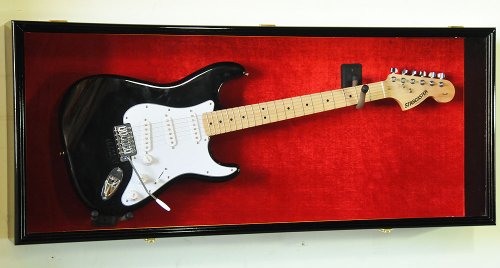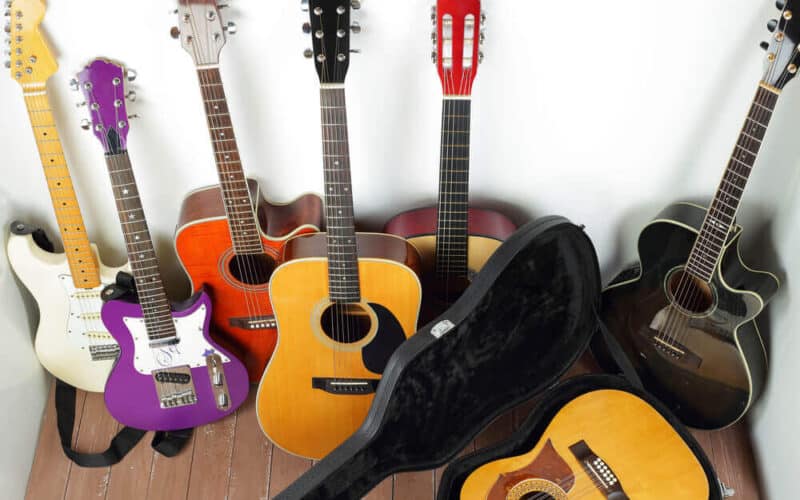Where we place or store our guitar whether regularly or for the long term will have a huge impact on the instrument. It will affect its overall sound quality, tone, hardware, and of course, longevity.
Guitar storage is actually one aspect that most novice guitarists tend to overlook especially if the instrument is in constant use. But seasoned shredders know that how we watch out for our axe especially how we store them would benefit us greatly.
Don’t worry, whether you need advice for long-term storage or for a guitar that you use all the time, we got you covered. We will also talk about how you may take care of multiple guitars at once if you store a few, take them touring altogether, or use them regularly.
We’re going to make sure to cover a lot of these useful topics. Here are some tips on how to store a guitar.
What are the General Ground Rules?
Overall, what are the rules that we should observe in guitar storage? Here are some tips to follow whether you store your guitar regularly after daily use or if you have just one or several instruments.
- The very first thing to remember before storing your guitars is to take charge of the string tension first. When in storage, you won’t need your strings to be tuned all the way to standard tuning especially in the long term since that would just apply unnecessary tension to your guitar’s neck, bridge, and body. But also, make sure not to loosen the string tension all the way down. Just lower it by one or two whole steps to prevent bowing when it’s too loose. If you are storing a detuned instrument for a long period of time that has a truss rod then it would be worthy to put back the truss rod in a neutral point.

- Remember that guitars are best stored inside their respective cases. If you have multiple guitars then surely you can afford to buy hard cases instead of gig bags for your instruments which are also quite valuable for touring or regular gigs. So take note, secure guitar in its case but not in a less protective gig bag.
- How you position your guitar cases once you’ve stored your instruments inside of them is also quite important. Make sure that your guitar cases are standing up and do not lie down on the ground. And please, don’t put several cases on top of one another. Stand them up right next to each other like in a rack which we are going to talk about in a bit.
- If standing up, for some reason, would not be a viable option, you may lay down the cases by its side. The side that’s pointing up should of course be the side with the handle. Again, put the cases right next to each other, no stacking.
- Next is to know which part of your house or building should you store your guitar. It’s best that you keep it away from the walls or windows or direct sunlight especially if you live in an area where the temperature may vary day in and day out. The nearer the storage place, closet, or room to the center of the house or building the better.
Temperature can affect your guitar’s body a lot. A case humidifier would help a lot too. Check these options! (Links to Amazon)
- LEVOIT Room Humidifiers – for large rooms where you’ll store all your guitars and gears.
- Oasis OH-2 Digital Hygrometer – to constantly check on the humidity level of the room and temperature changes so that you can keep an ideal climate-controlled environment (40-60% humidity level). Cause too much dryness or excess moisture will have a negative effect on the wood of the guitar.
- O Oasis Humidifier for Acoustic (OH-6) – a highly recommended guitar case humidifier.
- D’Addario Humidipak Automatic Humidity Control System – the soundhole humidifier or humidity pack you’d need for your Acoustic.
These humidifiers are especially useful during dry winter months and a good investment to ensure that your guitars will always be in tip-top shape.
- Oh, and always make sure to remove the vibrato arm of your guitars in storage should they have one.
What if I Always Need My Guitar within My Reach?
We’ve discussed how to store a guitar long-term mostly but not a lot of us have several guitars and can afford or need to store some for extended durations. Most guitarists will have their instrument by their side or within reach most of the time for practice, gigs, or recording.
But that doesn’t mean that we don’t store them properly and just leave them lying around anywhere. Whether that’s an acoustic or electric guitar, you need to store it the right way.
You’re going to need a few things, a guitar stand, a wall hanger, a guitar rack, and a display cabinet or hard shell case.
A guitar stand is probably the quickest and cheapest method that you can keep your guitar accessible at all times for you and not just let it lie around for you to possibly step on or sleep on (yes, that’s a true story).

They are cheap, sturdy, and will keep your guitar visible, and organized. Plus, your guitar will be positioned properly that it won’t be in any trouble of bending, bowing, or whatever damage it’s susceptible to when it’s just on the bed or floor.
You may put it beside your bed or computer ready for recording or jam sessions. They will also look cool in your rehearsal studio. It’s efficient and affordable. This works perfectly for those who probably just have less than 3 guitars at the same time.
Check out these awesome guitar stands (Links to Amazon):
- K&M Heli 2 Guitar Stand Folding A-Frame for Acoustic and Electric Guitar
- Hercules GS415BPLUS Plus Series Universal AutoGrip Guitar Stands
So, a guitar stand is easy, quick, and affordable, all you need to do is to find the right spot for it but it’s not the most space-efficient option especially if you have a lot of instruments. And, not the only affordable option we can recommend to you either.
How do You Store a Guitar without a Case or Stand?
What’s this option you may ask? Well, you can get creative with a simple guitar wall hanger. Wall hangers are perfect to organize, store, and keep your guitar risk-free within reach at all times. Plus, as mentioned, they are space-efficient, affordable, and neat.
A wall guitar holder such as the RockJam Wall Mount Bracket (Link to Amazon) can handle a guitar, is easily mountable, and has an auto-grip system that will keep your guitar safe and secure at all times.
You can hang your electric, acoustic, or bass guitars and won’t give up much space at all. You can also get creative with how you hang your guitars too and most of the time, it’s used to decorate a rehearsal or recording studio at the same time.
What’s great about wall mounts or hangers is that depending on your wall space and creativity you may hang as many guitars as you need or want. Also, there wouldn’t be any possibility that someone knocked over your guitar.
Guitar racks are a so one of many ways that you can store your guitars. They can hold certain amounts of instruments at the same time but they are pretty versatile. You can either find a spot for it in your home or studio but at the same time, guitar racks are also employed by touring musicians.

They are sturdy and will hold your guitars in the right order neatly. They can be brought on touring trucks or vans to take with you backstage on gigs so you’ll have access almost instantly to all your instruments when performing. They too are space savers. They will cost more but they offer great value for your money.
Check these neat guitar racks out (Links to Amazon):
Wait, there’s more! If you fancy displaying your guitars and showcasing them whether on your shop, studio, or house then maybe a cabinet or display case is what you’ve been looking for.

These are also space savers as you can mount them on your wall plus you get to showcase your case at the same time in a neat display. Also, cabinets keep your guitar secure from all the external elements (the ones that have glass covers) while keeping them within your reach anytime you need to use them.
They can be a tad expensive though and you’ll often see them used to display exclusive or luxury guitars, especially by proud owners. Whether it is storage or design you are after a good display cabinet or case is up for the task.
Check this cabinet case out (Link to Amazon): Guitar Display Cabinet Wall Rack
Frequently Asked Questions
What are the benefits of storing a guitar properly?
You protect your guitar from unwanted damages like denting, bending, or worse breaking them beyond repair. You protect them from external elements like extreme temperatures or poor humidity. You protect its parts and pickups to maintain sound quality. And most of all, you prolong your instrument’s life.
Is there any difference in approach in storing acoustic guitars as opposed to electric guitars?
In principle, not a lot. You may look after both your electric and acoustic guitars in the same manner. Perhaps they would differ in the overall maintenance process for as you know, electric guitars will use a different type of string as opposed to your acoustic.
Electric guitars will most likely have pickups as compared to most acoustic guitars that won’t. And lastly, you need to consider the hollow acoustic guitar body as opposed to the solid-bodied electric one. Take these aspects into consideration and tweak how you maintain your instrument accordingly.
Is it bad to always have your guitar out of its guitar case?
Not necessarily. If you put your guitar on a rack, wall hanger, stand, or cabinet then you can do away with the guitar case. As long as it’s not in any danger of getting trampled over then you should be fine. The only challenge here is to always keep the guitar where the humidity and temperature would be ideal for it as that’s where it’d be more protected if it’s inside a case.
What are the things that I should avoid when storing my guitars?
We already mentioned not stacking up the guitar cases with your guitars inside them or storing them near windows or outside walls. Also, take note that guitars do not bode well on beaches because of the salt in the air. Don’t even store it in your car trunk too!
Do specific guitar brands’ acoustic and electrics have specific storage needs?
None really. It’s just the aesthetics or the shape and size of your guitar that you need to consider when storing it. Some brands would naturally have the right case for their guitars acoustic and electric. Make sure that the stand, wall mount, cabinet, or rack can handle your guitar’s physical design too.
Final Thoughts
Storing your guitars properly for a long period of time or even just for the end of the day will do a lot of good for your instruments’ longevity. Musical instruments, in general, aren’t cheap and so we must be cautious to store them.
Besides, if you want to be good at something, especially at playing the guitar then you need to go about it in the right process. Pros and guitar virtuosos know that looking after your instrument is part of your improvement and journey as a guitar player.
So love your guitar with a passion and start with proper storage practices. Now, go rehearse some more.

